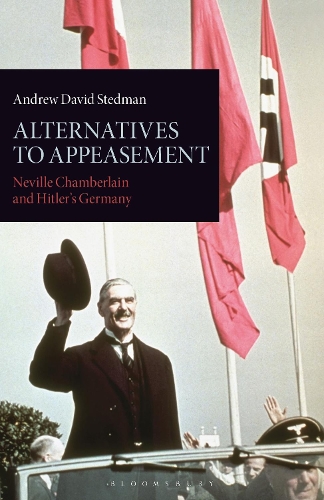
Alternatives to Appeasement: Neville Chamberlain and Hitler's Germany
(Hardback)
Publishing Details
Alternatives to Appeasement: Neville Chamberlain and Hitler's Germany
By (Author) Andrew David Stedman
Bloomsbury Publishing PLC
I.B. Tauris
30th April 2011
United Kingdom
Classifications
Tertiary Education
Non Fiction
Modern warfare
327.41009043
Physical Properties
Hardback
320
Width 146mm, Height 218mm, Spine 28mm
520g
Description
Neville Chamberlain's policy of appeasing Hitler's Germany has been widely condemned. However, historians (and politicians) have been divided about the viability of alternative courses of action. Andrew David Stedman's illuminating new study of British foreign policy before World War II systematically analyses the various alternatives to appeasement - from isolationism to collective security to outright war - and examines their origins, risks and feasibility. It surveys the advocates of other strategies - including key thinkers and decision-makers such as Churchill, Eden, Amery, Beaverbrook and Halifax - and outlines the complexities of the decisions they faced, which have previously been largely overlooked. Marking a valuable new contribution to appeasement historiography, this is the first work to synthesise all the alternatives available to Chamberlain, as well as illuminating policy debate within the British government. Stedman provides a vigorous analysis of Chamberlain's assessment of each rival policy, and shows why ultimately, he opted for appeasement.
Also contributing to debates on the use of appeasement in the modern world, this book will be essential reading for historians of World War II and the twentieth century, as well as scholars of International Relations.
Reviews
'Despite attracting a massive number of publications over time, appeasement and British foreign policy remains, and will remain, a major historical topic for teaching and research purposes. Moreover, appeasement has become a central part of contemporary political vocabulary on both sides of the Atlantic in a manner focusing implicitly and explicitly on its feasibility and alternatives. Andrew David Stedman's book targets an aspect surprisingly overlooked or glossed over by existing publications, that is the feasibility of the alternatives to appeasement.' - Peter J. Beck, Emeritus Professor of International History, Kingston University; 'Andrew David Stedman's book on appeasement and British foreign policy in the interwar period represents a major new and important contribution to historical understanding of the subject. It is the first significant synthesis of competing historiographical approaches in recent years, and a clear presentation of the way in which contemporary discussions transformed themselves throughout the course of the 1930s. One of the central strengths of this work is its methodological and historical focus on the evolving discourse of appeasement. Stedman shows clearly the trajectory of the discussion about appeasement. In so doing, he charts implicitly both the declining fortunes of Chamberlain and his room for manoeuvre, and the rising likelihood of war. By illustrating how the discussion of appeasement developed, and how options were proposed, debated and tested, he also puts forward significant arguments relating to Chamberlain's tireless willingness to explore alternatives to war. While not overlooking his weaknesses, Stedman presents the moral complexities of Chamberlain's situation. This is the first study to take this approach, and represents an important contribution to the discussion and understanding of appeasement.' - John R. Davis, Professor of History and International relations, Kingston University
Author Bio
Andrew David Stedman teaches history at Newcastle University. He holds a PhD from University of Kingston and was awarded the British International History Group Thesis Prize in 2008.
